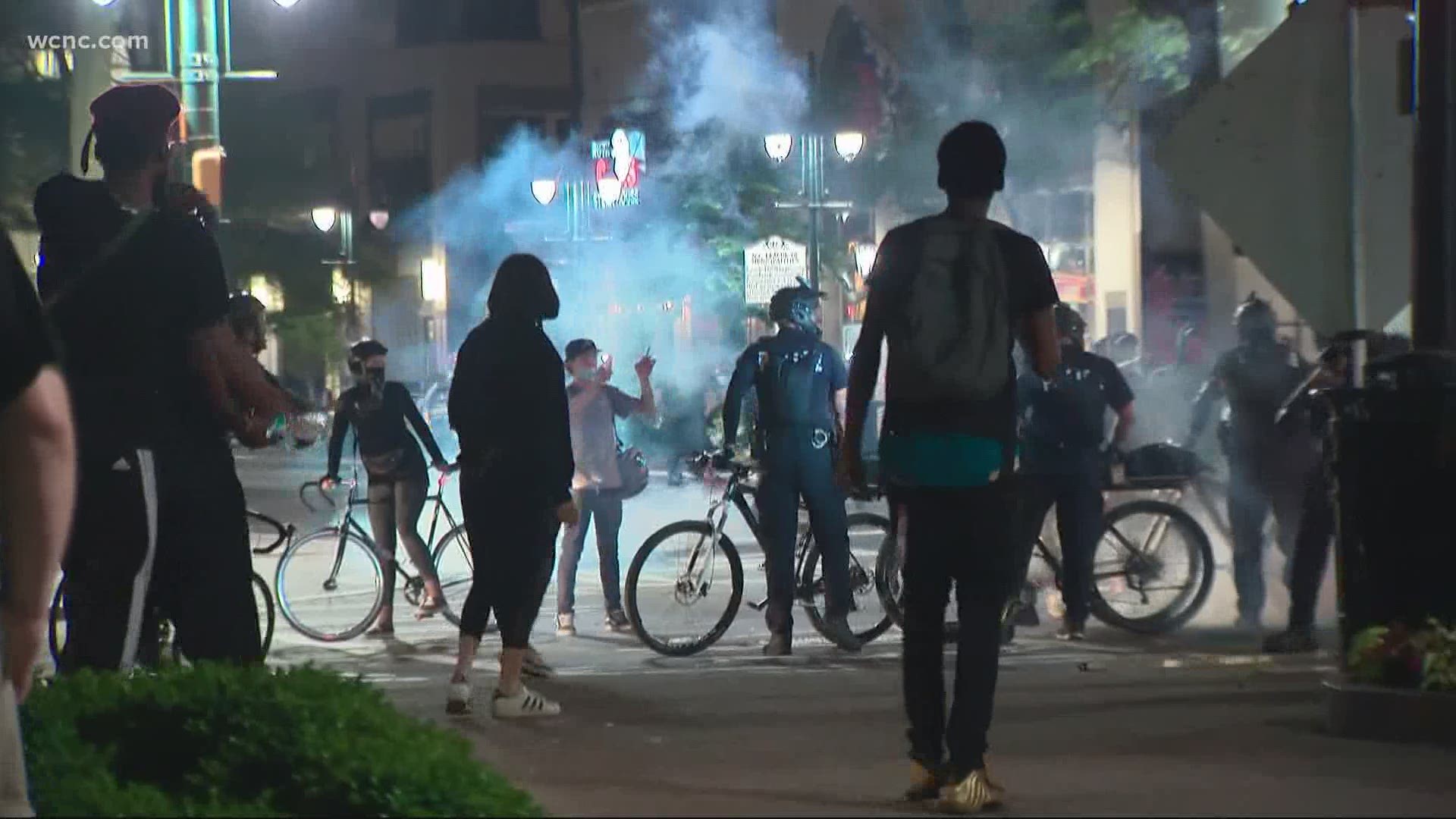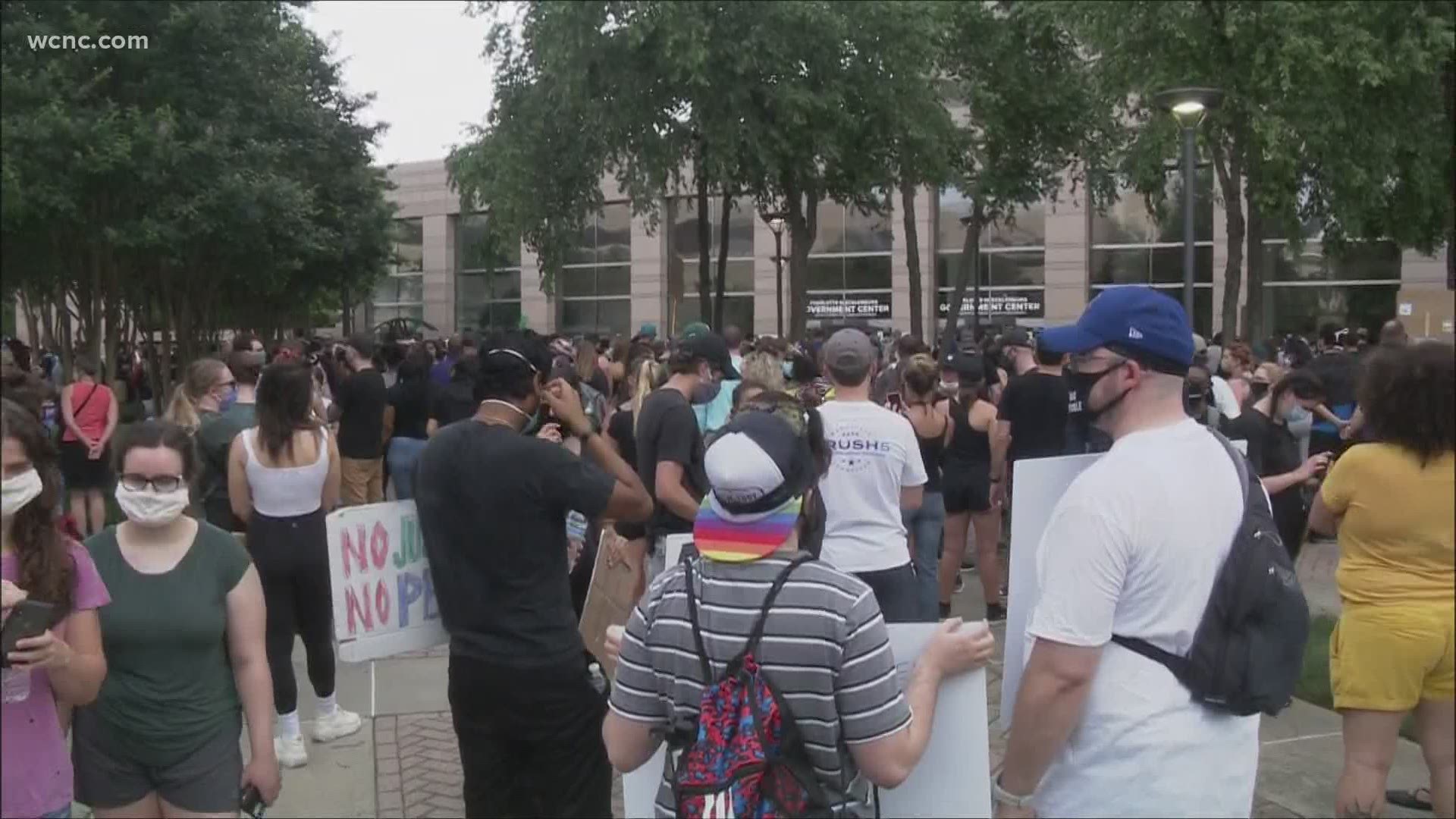CHARLOTTE, N.C. — It was a busy night for Charlotte’s City Council. Monday night's meeting had several big topics on the agenda, including summer conventions like the RNC, and several votes including restricting CMPD’s use of force policies.
City Council was also expected to vote on the city’s 2021 budget, and a big component of that is whether they’ll move to defund the use of chemical weapons like tear gas from the Charlotte-Mecklenburg Police Department’s budget.
During the meeting, Councilman Braxton Winston made a motion to ban the purchase of chemical agents for purpose of crowd control or dispersal. After nearly an hour of discussion, the council put it to a vote.
The motion passed, 9-2. The two no votes were from Councilman Tariq Bokhari and Councilman Ed Driggs, who both asked city leaders not to paint the law enforcement industry with a broad brush.
"Not to allow that desire for action to manage itself as a hasty thing to do something, just to appease those who have a very important message they are sending us right now," Bokhari said.
The passing of the motion means CMPD will not be allowed to buy chemical agents that would be used to break up crowds in Fiscal Year 2021. However, it does not mean they couldn't use the ones they currently have if things were to get violent again.
This year, CMPD spent $103,000 on chemical agents, per the city's budget director. Council will later decide where that roughly $100,000 will go now that it won't be used for chemical munitions.
The policy came after passionate pleas from both political sides.
The policy also allows the Safe Communities committee to review and scrutinize police spending and policy.
"If you cannot figure out how to deal with human beings without the tactics of violence and fear, the human beings that make up this city will be there step by step to show you how to deal with us as sentient beings that we are," Winston said.
City leaders ended up passing the budget with roughly $290 million going toward CMPD. An update on COVID-19 was moved to the next meeting.
Earlier Monday, more than a hundred protestors gathered outside the Government Center in Uptown, as Charlotte City Council began their virtual session, but the council said they were already prepared to take action.
The action comes less than a week after CMPD used tear gas on a crowd in uptown Charlotte.
Also during the meeting Monday, a resolution drafted by democratic council member Larken Egleston called for the city manager to perform a thorough review of CMPD’s current policies, in a move to align them with the practices recommended by the national "8 Can't Wait" campaign.
"Even if there’s parts of this that CMPD is already doing in practice if we can codify that and make sure that the community understands what our expectations of our officers are, that transparency and that clarity in our language will help create better outcomes and help create better interaction between our citizens and police," Egleston said.
During the meeting, Charlotte City Council unanimously passed the resolution. This means the city manager will compare current CMPD policies with the #8CantWait policies and see what further action is needed.
Charlotte City Councilman Larken Egleston says this will not be the only thing the city does to create change in policies.
The "8 Can't Wait" campaign started when researchers analyzed the policing tactics of the top 100 largest US cities, according to their website.
They found there were eight types of restrictions in police use of force policies that were associated with reductions in killings by police, including banning chokeholds and prohibiting officers from shooting at moving vehicles.
While many police departments already have variations of those restrictions in place, including the Charlotte-Mecklenburg Police Department who implements 3 of 8, the organization says when a department adopts all 8, there is a 72% reduction in police-involved killings.
At least two US cities have implemented all 8, San Francisco, California and Tuscon, Arizona. Now Charlotte could be next.
“We have 18,000 plus law enforcement agencies across the country and they all need guidance,” says Dr. Joseph Kuhns, a criminal justice professor at UNCC.
Dr. Kuhns says there are no federal or state guidelines on use of force, leaving tactics to vary widely from one police department to the next.
He says the ‘8 Can’t Wait’ campaign is a step toward consistency, and agrees it’s reasonable to have some consistency in use of force policies across law enforcement agencies whether they’re local, county, state or federal, but says it shouldn’t be viewed as a one-size-fits-all approach.
“Some may not be appropriate for all police agencies depending on where you are in the country,” he says.
Dr. Kuhns says he believes we can make true progress in reducing use of force if we address firearms ownership.
“We have more guns in our country than we have people, so you’re asking police officers to work in an environment where many, many, many citizens are armed," he says.
He adds that in other countries, where firearms aren’t as accessible, the use of force is not as prevalent as an issue.
“This is a heavily armed United States on both sides, the law enforcement side and the citizen side and so it creates a difficult environment to enforce the law for that reason.”
WCNC Charlotte reached out to CMPD to see if they would continue to use chemical agents on protesters who turn violent but WCNC has not yet heard back.
RELATED: Remembering George Floyd: Thousands pass through Fountain of Praise church for public viewing


